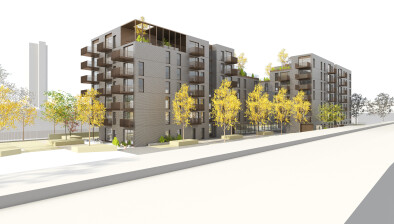Savills research unveils scale of sustainability challenge for residential sector
The scale of the challenge facing the UK’s real estate sector in achieving net zero, with particular difficulties facing the residential sector due to its scale and the need to incentivise owner-occupiers to make improvements, has been highlighted in new research by Savills.

Savills has estimated that £330 billion is needed to implement all potential energy efficiency improvements the UK residential housing sector requires, in order to meet 2035 targets.
Launched today in Glasgow, Savills research identifies parts of commercial, residential and rural property markets that are already providing opportunities for green investment, as well as those that need further regulation and policy support to switch to a more sustainable approach.
According to the reserach, the residential sector is responsible for a fifth of the UK’s carbon emissions, (67.7m tonnes emitted in 2020, up 9% between 2014 and 2020), with the vast majority (70%) of this coming from heating properties, with older homes presenting the greatest challenge.
However, payback on many energy improvements remains unattractive as it would take approximately 36 years to recoup the cost of improving a D rated home to B standard via savings on energy bills, according to the English Housing Survey.
As such, Savills suggests that grants and green finance initiatives alone are unlikely to facilitate the step-change in investment in energy efficiency needed to meet government targets. With the government likely to impose EPC targets for lenders, the cost and terms on which mortgage finance can be obtained have the potential to change the equation for those with a mortgage.
However, the research warns that even this will not go far enough. More than 10 million homes are owned outright – increasing by 1.6 million in just the past 10 years.
Discounts and surcharges on discount-specific taxes such as stamp duty and council tax could also be considered – these have the potential to increase the ‘green premium’ and ‘brown discount’ of housing, providing a greater incentive for owners to invest. But, it should be noted that this would be politically sensitive, requiring, among other things, concessions for heritage properties.
Chris Cummings, Savills Earth’s engineering and design expert, said: “The multi-faceted nature of the real estate sector, with its complex ownership structure, means that there is no one-size-fits-all solution to our particular climate change challenges. Savills research has uncovered a range of challenges including inconsistent efficiency standards and performance data, lack of contractor capacity and risks associated with investing upfront in brand new technology.
“Encouragingly a growing understanding of embodied carbon measurement is already helping to deliver greener credentials of older stock. Yet market forces on their own are insufficient if we’re to play our part in helping the UK reach its net zero targets. Policy stability and long-term vision from the government is needed for real estate to make a smooth transition to a low carbon economy.
“Defined target dates for efficiency standards will undoubtedly encourage the development of a green premium. Improved emissions performance data will support investor confidence, and embodied carbon accounting will lead to increased opportunities for older stock.”
Richard Rees, managing director, Savills UK, added: “The question of unlocking investment is a key issue for the real estate sector as we aim to reach our own sustainability goals. The Environmental, Social and Governance agenda is often framed in terms of risk, stranded assets and the high cost of achieving carbon neutrality. But the scale of change needed presents forward-looking investors with new opportunities and investing in green property does not necessarily mean sacrificing returns.”







